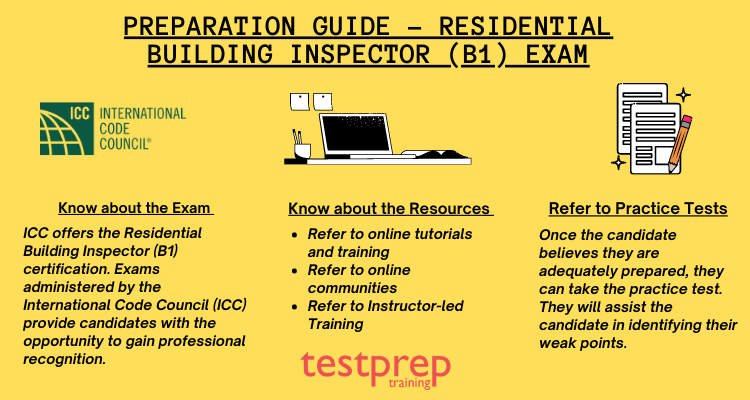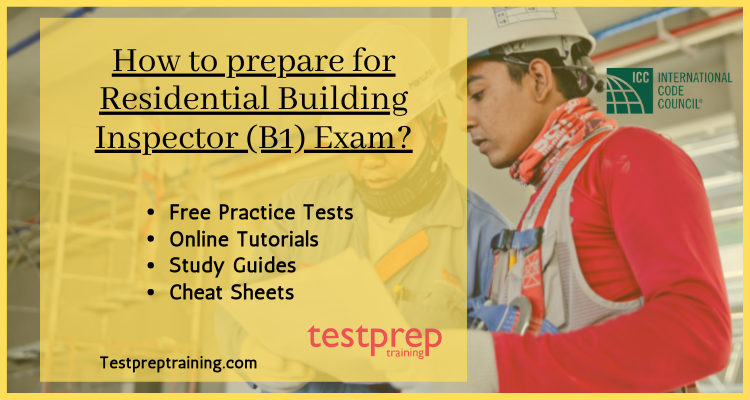The Residential Building Inspector (B1) Exam is a certification exam offered by the International Code Council (ICC) for individuals who want to become certified residential building inspectors. The exam assesses the knowledge and skills required to inspect residential buildings for compliance with building codes and standards.
The exam covers a variety of topics, including building codes, plans and specifications, construction materials and methods, electrical systems, plumbing systems, mechanical systems, fire protection systems, and safety regulations. It also tests the candidate’s ability to perform inspections, identify violations, and communicate effectively with building owners, contractors, and other stakeholders.
Residential Building Inspector (B1) Exam Glossary
Here are some key terms that are important to know for the Residential Building Inspector (B1) Exam:
- Building codes: Regulations that set standards for the design, construction, and maintenance of buildings to ensure public safety and health.
- International Residential Code (IRC): A building code that sets standards for residential construction and is widely used in the United States.
- Plans and specifications: Detailed drawings and documents that outline the design and construction requirements for a building project.
- Construction materials and methods: The types of materials and techniques used in building construction, such as framing, insulation, roofing, and siding.
- Electrical systems: The wiring, fixtures, and equipment used to provide electricity to a building.
- Plumbing systems: The pipes, fixtures, and appliances used to supply and remove water and waste from a building.
- Mechanical systems: The heating, ventilation, and air conditioning (HVAC) systems used to provide temperature control and indoor air quality in a building.
- Fire protection systems: The systems and devices used to detect and suppress fires in a building, such as sprinkler systems and smoke detectors.
- Safety regulations: Rules and guidelines designed to protect workers and occupants from hazards and ensure compliance with building codes and standards.
- Inspection procedures: The methods and techniques used to conduct building inspections, including visual inspections, testing, and documentation.
Remember to review these terms and concepts in detail as part of your preparation for the Residential Building Inspector (B1) Exam. Good luck!
Residential Building Inspector (B1) Exam Guide
Here are some official resources from the International Code Council (ICC) that you can use to prepare for the Residential Building Inspector (B1) Exam:
- Exam information: The ICC provides detailed information about the exam, including the format, content, and passing requirements. You can find this information on the ICC website at https://www.iccsafe.org/certification-exam-catalog/residential-building-inspector-b1/.
- Study materials: The ICC offers a variety of study materials for the Residential Building Inspector (B1) Exam, including study guides, online courses, and practice exams. You can find these materials on the ICC website at https://www.iccsafe.org/certification-exam-catalog/residential-building-inspector-b1/study-materials/.
- Code books: The Residential Building Inspector (B1) Exam is based on the International Residential Code (IRC) and other relevant codes and standards. The ICC offers print and digital versions of these code books, which are available for purchase on the ICC website at https://www.iccsafe.org/store/.
- Certification FAQs: The ICC provides answers to frequently asked questions about the certification, including eligibility requirements, exam fees, and exam scheduling. You can find these FAQs on the ICC website at https://www.iccsafe.org/certification-exam-catalog/residential-building-inspector-b1/certification-faqs/.
Remember to use these resources as part of your exam preparation and to stay up to date on the latest certification requirements and standards. Good luck on your Residential Building Inspector (B1) Exam!
Residential Building Inspector (B1) Exam Tips and Tricks
Here are some tips and tricks that can help you prepare for and pass the Residential Building Inspector (B1) Exam:
- Review the exam content: The exam covers a wide range of topics related to building codes, construction materials and methods, electrical and plumbing systems, mechanical systems, fire protection systems, and safety regulations. Make sure to review the exam content thoroughly and focus on the areas where you need the most improvement.
- Use study materials: The International Code Council (ICC) provides a variety of study materials, including study guides, online courses, and practice exams. Use these materials to get a better understanding of the exam content and to practice answering exam questions.
- Learn the codes and standards: The Residential Building Inspector (B1) Exam is based on the International Residential Code (IRC) and other relevant codes and standards. Make sure to become familiar with these codes and standards and how they apply to residential construction.
- Practice inspection procedures: The exam assesses your ability to perform inspections, identify violations, and communicate effectively with building owners, contractors, and other stakeholders. Practice inspection procedures and communication skills to improve your chances of passing the exam.
- Manage your time: The exam is timed, and you will need to answer a large number of questions within a limited amount of time. Make sure to manage your time effectively during the exam and to answer the questions you know first before moving on to more difficult questions.
- Stay calm and focused: The exam can be stressful, but it’s important to stay calm and focused. Take deep breaths, read the questions carefully, and try not to rush through the exam.
Now that we know about the exam, let’s now look at a step by step guide to qualify for the exam –
Step by Step Guide to pass the Residential Building Inspector (B1) Exam Tips and Tricks Exam
In a nutshell, there is no such thing as a one-size-fits-all study strategy. Everyone learns in a unique way and has a unique level of experience with the material. The good news is that everyone can benefit from these essential Residential Building Inspector (B1) Exam study tips. Let’s start with the strategy –

1. Know about the Residential Building Inspector (B1) Exam bus
The B1 Residential Building Inspector exam has been constructed on the basis of the following potential areas:
Code Administration 4%
- Project Administration
- Public Information and Legal
Building Planning 8%
- Unit Separation
- Building Location
- Room and Opening Dimensions
Footings and Foundations 16%
- Footings
- Stepped Footings and Special Foundations
- Columns and Piers
- Site Preparations, Foundation, and Basement Walls
Floor Construction 14%
- Lumber Quality – Floors
- Floor Joist Framing
- Concrete Slab Inspection
- Subflooring and Decking
- Crawl Spaces
- Draftstops
Wall Construction and Coverings 27%
- Lumber Quality – Walls
- also, Wood Framing – Walls
- furthermore, Header Spans
- moreover, Steel Framing
- also, Fireblocking
- furthermore, Masonry Materials and Placement
- moreover, Concrete Wall Inspection
- also, Braced Wall Panels
- furthermore, Interior Coverings
- moreover, Exterior Sheathing, Veneers, and Weather-Resistant Coverings
- Exterior Plaster, Stucco, and Lath
Roof/Ceiling Construction 14%
- Roof/Ceiling Insulation and Vapor Barriers
- also, Attics/Ceiling
- furthermore, Roof Framing
- moreover, Roof Sheathing
- also, Roofs and Roof Coverings and Reroofing
- furthermore, Fireplaces and Chimneys
Public Safety and Special Construction 17%
- Exit Stairways and Ramps
- Exterior Construction
- Smoke Detectors
- Flamespread of Insulation and Finishes
- Safety Glazing
2. Know about the Exam Format
The exam ID for the B1 Residential Building Inspector exam is B1. The exam is an open-book examination. The candidate will have two hours to complete the exam successfully. There will also be 60 questions. Computer-Based Testing (CBT) and Proctored Online Testing will be used for the Residential Building Inspector (B1) exam. The examination fee for the ICC will be $219 USD. The candidate can register for the exam on both the ICC and Pearson VUE websites.
3. Is Residential Building Inspector a good career to explore?
Construction and building inspectors earned a median annual salary of $62,860. The median wage is the wage at which half of the workers in a given occupation earned more and half earned less. The lowest 10% earned less than $37,850, while the highest 10% earned more than $101,170.
Despite declining employment, an average of 14,300 openings for construction and building inspectors are expected each year over the next decade. All of those positions are expected to be created as a result of the need to replace workers who transfer to other occupations or leave the labor force for other reasons, such as retirement.
So, Yes! Residential Building Inspector is a career worth exploring as it offers promising employment and a competitive salary!
4. Refer to the apt learning resources
Here are some resources that will help you ace the exam in one go!
ICC Learning Center
In addition, the candidate may visit the ICC Learning Center. Every exam is covered by a training program at the ICC Learning Center. The ICC Learning Center offers programs for specific exams that include all exam information such as description, intended audience, delivery method, duration, and so on. To prepare for the Residential Building Inspector certification, the candidate should enrol in a training program. The candidate will receive in-person instruction from ICC experts in one of their state-of-the-art training facilities as part of the training courses with ICC. This is a completely hands-on learning experience, with a subject matter expert guiding candidates through each exercise and answering all of their questions.
Join a Study Group
Participating in a group study or an online community will also be beneficial to the candidate. It will motivate them to work harder. Furthermore, studying in a group will allow them to stay connected with other people who are on the same path as them. Furthermore, the discussion of such study groups will help students in their exams.
Refer Books and Prep Guide
Reference books are also a great source to prepare for the Residential Building Inspector Exam. The preparation books focus on key exam objectives including building, plumbing, mechanical, fuel gas, energy, electrical provisions and more. Some of the prominently used study manuals include –
- 2015 International Residential Code for One- and Two-Family Dwellings 1st Edition by International Code Council
- 2015 B1 Exam Prep Manual: Residential Building Inspector Paperback – January 1, 2015 by Access License Schools (Author)
- International Residential Code (IRC) by Builder’s Book (Author) and Christiana Kouzman (Illustrator)
Evaluate with Free Practice Test
Practice tests are used to reassure candidates about their preparation. The B1 Residential Building Inspector practice exam will assist candidates in identifying their weak points so that they can work on them. Nowadays, there are numerous B1 Residential Building Inspector practice tests available on the internet, so the candidate can select which one they prefer. Now is the time for the candidate to begin taking the Residential Building Inspector sample exam!
Bonus Tip!
Make a list of when you plan to take the exam and the steps you’ll need to take to get there. For instance, how many chapters do you need to read per week if you plan to review practice questions, and how and when do you plan to do final prep before your exam? Another question you may have is, “How long should I study?” The answer is straightforward: everyone is unique.
Most people take between 3 and 9 months to prepare, depending on their relevant experience. Ultimately, committing to an exam date is one of the most important steps you can take. When you have competing priorities, picking an exam date and writing down your study plan can help you stay focused. Hurry up and begin preparing right away!





